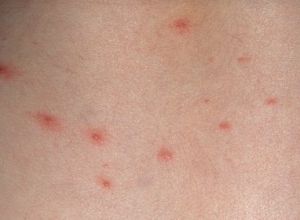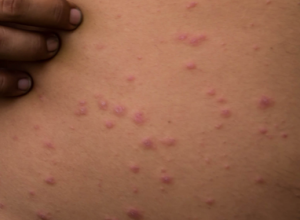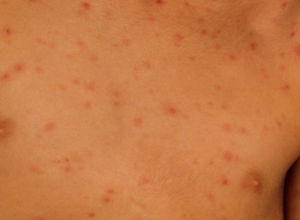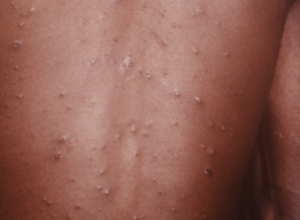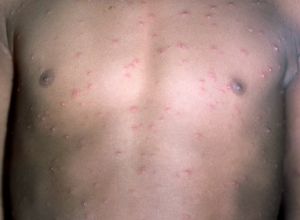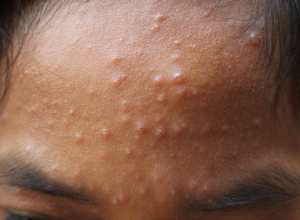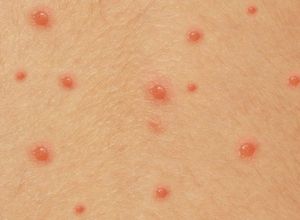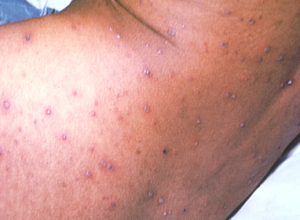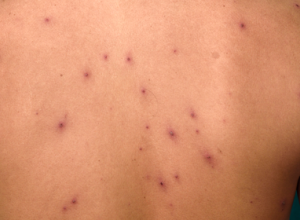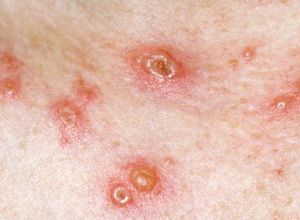Chickenpox
Chickenpox is a very common childhood illness, caused by a virus called varicella.
It starts with red bumps that become small, yellowish blisters affecting the whole body
including the mouth and genitals (which can be very painful). They then open before
scabbing over. These are very itchy and can make your child miserable. They may have a
temperature, a cough and a runny nose.
Children are able to pass the virus to others from the day before the rash appears until the
last spot has scabbed over.
Chickenpox rarely needs treatment, unless in a new-born baby, or in a child with a known
weak immune system (for example due to weakened immune system due to anti-cancer
treatment, immunosuppressive treatment or genetic immunodeficiency). If you are not sure
it is chickenpox look at other childhood rashes
Top Tip
Chickenpox is one of the only rashes that gives spots on the scalp!
Please contact your GP your child's own hospital doctor if:
They are on medicine that affects their immune system (immunosuppressive medication eg chemotherapy, high dose steroids) or are under a month old, they made need treatment straight away.
Stage 1: small spots appear
Stage 2: the spots become blisters
Stage 3: the blisters become scabs
If your child has any of the following:
- Breathing very fast, too breathless to talk, eat or drink
- Working hard to breathe, drawing in of the muscles below the rib, unable to talk or noisy breathing (grunting)
- Breathing that stops or pauses
- Is pale, blue, mottled or feels unusually cold to touch
- Difficult to wake up, very sleepy or confused
- Weak, high-pitched cry or can’t be settled
- Has a fit (seizure)
- Develops a rash that does not disappear with pressure and seems unwell (see the 'Glass Test')
- A temperature less than 36oC or temperature 38oC or more if baby is less than 3 months
You need urgent help.
Go to the nearest Hospital Emergency (A&E) Department or phone 999
If your child has any of the following:
-
Increasing pain and redness between the spots:
-
New blisters/spots appearing after 7 days Rash spreading to the eyes
-
Baby less than 4 weeks old
-
Breathing a bit faster than normal or working a bit harder to breathe
-
Dry skin, lips or tongue
-
Not had a wee or wet nappy in last 8 hours
-
Poor feeding in babies (less than half of their usual amount)
-
Irritable (Unable to settle them with toys, TV, food or hugs even after their fever has come down)
-
Is 3-6 months old with temperature 39°C or above (unless fever in the 48 hours following vaccinations and no other red or amber features)
-
Temperature of 38°C or above for more than 3 days, shivering with fever
(rigors) or if the temperature comes back after a few days -
Temperature less than 36°C in those over 3 months
-
Getting worse or you are worried about them
-
A parent is pregnant and has not previously had chickenpox
Contact with a pregnant woman who has not previously had chickenpox, person with a weakened immune system who has not previously had chickenpox or a newborn baby (the contact should seek advice from a healthcare professional)
You need to contact a doctor or nurse today.
Please ring your GP surgery or call NHS 111 - dial 111
If none of the above are present:
- Watch them closely for any change and look out for any red or amber
symptoms - If your child has any other symptoms associated with their fever, you may
want to look at the information on sore throat, cough, earache, diarrhoea
and vomiting or tummy ache or our other pathways. - Additional advice is also available to young families for coping with crying of well babies.
Self care
Continue providing your child’s care at home. If you are still concerned about your child, call NHS 111 – dial 111
This guidance has been reviewed and adapted by healthcare professionals across North East and North Cumbria with consent from the Hampshire development groups.
What can you do to help your child?
Seeing your child unwell with chickenpox can be very distressing for a parent and while there is usually no treatment for the virus itself, there are simple things you can do to make your child more comfortable:
- Regular Paracetamol for temperature/pain
- Antihistamines (eg piriton) can help with itching and aid sleep
- Drink plenty of fluid and try ice lollies if your child is not drinking much
- Calamine lotion/oat milk bath/Sodium bicarbonate bath for itch
- Pat dry after bath rather than rubbing for comfort
- Dress in loose clothes
- Don’t give ibuprofen or aspirin unless advised to by a doctor
- Cut nails/apply hand mittens at night to reduce damage to skin and try to
- Avoid too much scratching if possible
How long does it last?
- Usually the last spot has crusted over by 5-7 days after the rash first appears
- It is highly contagious until spots have dried and scabbed over
- Avoid nursery or school for 5 days from rash onset or until all spots are fully scabbed over
- Avoid contact with new-born babies, people with a weakened immune system and pregnant women until all of their spots have scabbed over. If concerned regarding this contact your GP
The chickenpox vaccine
The chickenpox vaccine is a vaccine used to prevent catching and spreading the disease. It has recently been recommended but is not yet part of the standard vaccine programme but is offered to children who are at increased risk of severe chickenpox infection and to those with a family member at risk of complications. It is also available privately through travel clinics and pharmacies and costs between £120-£200. More information is available at Chickenpox vaccine overview - NHS (www.nhs.uk)
How is chickenpox spread?
Children and adults can get chickenpox, but it is more common in children. Chickenpox is highly contagious, which means it is very easy to catch. It can be spread by having direct contact with the person who has chickenpox, especially by touching the liquid from the blisters. Chickenpox is also spread by the fluids that are coughed or sneezed into the air.
If your child has chickenpox, they are infectious to others from one to two days before the rash first appears up until the last blisters have dried up. Some members of the family may need to stay away from the child during this infectious stage. Anyone taking long-term oral steroids or who is immunocompromised (has a weakened immune system e.g. due to chemotherapy), pregnant women or babies under three months should see a GP if they could have been exposed to chickenpox, as they may need treatment to prevent the virus.
Children with chickenpox should not go to child care, kindergarten or school until the last blister has dried, (see our should my child go to school page). A dry blister scab is not infectious. You should tell the school if your child gets chickenpox, as there may be other children who need to be immunised or treated.
Key points to remember
- Chickenpox is very easy to catch, and is infectious for one to two days before the rash starts up until the last blister has dried.
- The rash usually starts between 10 to 21 days after the first exposure to chickenpox
- Antibiotics will not cure chickenpox.
Common questions our doctors are asked
Will my child’s chickenpox blisters scar?
Chickenpox sometimes causes pockmark scars on the skin. Regular chicken pox blisters do not scar, but if they are scratched or become infected, they are more likely to leave permanent marks on the skin.
How can I stop my child scratching their rash?
There are many medications and creams that you can buy from your local pharmacy to help with the itching – ask your pharmacist for advice. Young children and babies might need to wear mittens to help prevent them from scratching.
What can I do about the blisters inside my child’s mouth?
Unfortunately, there isn’t much you can do to help the blisters. Try giving your child paracetamol or ibuprofen to relieve the pain. If your child is in so much pain from mouth blisters that they are not drinking, they will need to be admitted to hospital to prevent dehydration.
What are the serious complications of chickenpox?
One in 5000 people who catch chickenpox will develop a brain inflammation called encephalitis, and three in 100,000 will die. These complications are very rare and most children make a full recovery.
Can my child be immunised against chickenpox?
You can get the chickenpox vaccine on the NHS if there's a risk of harming someone with a weakened immune system if you spread the virus to them.
For example, a child can be vaccinated if 1 of their parents is having chemotherapy.
You can also pay for the vaccine at some private clinics or travel clinics. It costs between £120 and £200.
Where should you seek help?
- If it is non-urgent, speak to your local pharmacist or health visitor.
- If your child has any of the above features, urgently see your GP. For an urgent out-of-hours GP appointment, call NHS 111.
- You should only call 999 or go to your nearest A&E department in critical or life threatening situations.
Pharmacists are experts in many aspects of healthcare and can offer advice on a wide range of long-term conditions and common illnesses such as coughs, colds and stomach upsets. You don’t need an appointment and many have private consultation areas, so they are a good first port of call. Your pharmacist will say if you need further medical attention.
Sound advice
- Visit a pharmacy if your child is ill, but does not need to see a GP.
- Remember that if your child's condition gets worse, you should seek further medical advice immediately.
- Help your child to understand - watch this video with them about going to the pharmacy.
For information on common childhood illnesses go to What is wrong with my child?
Pharmacists are experts in many aspects of healthcare and can offer advice on a wide range of long-term conditions and common illnesses such as coughs, colds and stomach upsets. You don’t need an appointment and many have private consultation areas, so they are a good first port of call. Your pharmacist will say if you need further medical attention.
Sound advice
- Visit a pharmacy if your child is ill, but does not need to see a GP.
- Remember that if your child's condition gets worse, you should seek further medical advice immediately.
- Help your child to understand - watch this video with them about going to the pharmacy.
For information on common childhood illnesses go to What is wrong with my child?
Health visitors are nurses or midwives who are passionate about promoting healthy lifestyles and preventing illness through the delivery of the Healthy Child Programme. They work with you through your pregnancy up until your child is ready to start school.
Health Visitors can also make referrals for you to other health professionals for example hearing or vision concerns or to the Community Paediatricians or to the child and adolescent mental health services.
Contact them by phoning your Health Visitor Team or local Children’s Centre.
Sound advice
Health visitors also provide advice, support and guidance in caring for your child, including:
- Breastfeeding, weaning and healthy eating
- Exercise, hygiene and safety
- Your child’s growth and development
- Emotional health and wellbeing, including postnatal depression
- Safety in the home
- Stopping smoking
- Contraception and sexual health
- Sleep and behaviour management (including temper tantrums!)
- Toilet training
- Minor illnesses
For more information watch the video: What does a health visitor do?
Health visitors are nurses or midwives who are passionate about promoting healthy lifestyles and preventing illness through the delivery of the Healthy Child Programme. They work with you through your pregnancy up until your child is ready to start school.
Health Visitors can also make referrals for you to other health professionals for example hearing or vision concerns or to the Community Paediatricians or to the child and adolescent mental health services.
Contact them by phoning your Health Visitor Team or local Children’s Centre.
Sound advice
Health visitors also provide advice, support and guidance in caring for your child, including:
- Breastfeeding, weaning and healthy eating
- Exercise, hygiene and safety
- Your child’s growth and development
- Emotional health and wellbeing, including postnatal depression
- Safety in the home
- Stopping smoking
- Contraception and sexual health
- Sleep and behaviour management (including temper tantrums!)
- Toilet training
- Minor illnesses
For more information watch the video: What does a health visitor do?
Midwives provide advice, care and support for women and their babies during pregnancy, labour and the early postnatal period. They provide health education and parenting advice until care is transferred to a health visitor. This usually happens when your baby is about 2 weeks old.
Sound Advice
A midwife is an expert in normal pregnancy and birth.
Midwives provide advice, care and support for women and their babies during pregnancy, labour and the early postnatal period. They provide health education and parenting advice until care is transferred to a health visitor. This usually happens when your baby is about 2 weeks old.
Sound Advice
A midwife is an expert in normal pregnancy and birth.
GPs assess, treat and manage a whole range of health problems. They also provide health education, give vaccinations and carry out simple surgical procedures. Your GP will arrange a referral to a hospital specialist should you need it.
Sound advice
You have a choice of service:
- Doctors/GPs can treat many illnesses that do not warrant a visit to A&E.
- Help your child to understand – watch this video with them about visiting the GP or going to a walk in centre
For information on common childhood illnesses go to What is wrong with my child?
GPs assess, treat and manage a whole range of health problems. They also provide health education, give vaccinations and carry out simple surgical procedures. Your GP will arrange a referral to a hospital specialist should you need it.
Sound advice
You have a choice of service:
- Doctors/GPs can treat many illnesses that do not warrant a visit to A&E.
- Help your child to understand – watch this video with them about visiting the GP or going to a walk in centre
For information on common childhood illnesses go to What is wrong with my child?
If you’re not sure which NHS service you need, call 111. An adviser will ask you questions to assess your symptoms and then give you the advice you need, or direct you straightaway to the best service for you in your area.
Sound advice
Use NHS 111 if you are unsure what to do next, have any questions about a condition or treatment or require information about local health services.
For information on common childhood illnesses go to What is wrong with my child?
If you’re not sure which NHS service you need, call 111. An adviser will ask you questions to assess your symptoms and then give you the advice you need, or direct you straightaway to the best service for you in your area.
Sound advice
Use NHS 111 if you are unsure what to do next, have any questions about a condition or treatment or require information about local health services.
For information on common childhood illnesses go to What is wrong with my child?
A&E departments provide vital care for life-threatening emergencies, such as loss of consciousness, suspected heart attacks, breathing difficulties, or severe bleeding that cannot be stopped. If you’re not sure it’s an emergency, call 111 for advice.
Sound advice
A&E departments provide vital care for life-threatening emergencies, such as loss of consciousness, suspected heart attacks, breathing difficulties, or severe bleeding that cannot be stopped. If you’re not sure it’s an emergency, call 111 for advice.
Sound advice
School nurses care for children and young people, aged 5-19, and their families, to ensure their health needs are supported within their school and community. They work closely with education staff and other agencies to support parents, carers and the children and young people, with physical and/or emotional health needs.
Contacting the School Nurse
Primary and secondary schools have an allocated school nurse – telephone your child’s school to ask for the contact details of your named school nurse.
There is also a specialist nurse who works with families who choose to educate their children at home.
Sound Advice
Before your child starts school your health visitor will meet with the school nursing team to transfer their care to the school nursing service. The school nursing team consists of a school nursing lead, specialist public health practitioners and school health staff nurses.
They all have a role in preventing disease and promoting health and wellbeing, by:-
- encouraging healthier lifestyles
- offering immunisations
- giving information, advice and support to children, young people and their families
- supporting children with complex health needs
Each member of the team has links with many other professionals who also work with children including community paediatricians, child and adolescent mental health teams, health visitors and speech and language therapists. The school health nursing service also forms part of the multi-agency services for children, young people and families where there are child protection or safeguarding issues.
School nurses care for children and young people, aged 5-19, and their families, to ensure their health needs are supported within their school and community. They work closely with education staff and other agencies to support parents, carers and the children and young people, with physical and/or emotional health needs.
Contacting the School Nurse
Primary and secondary schools have an allocated school nurse – telephone your child’s school to ask for the contact details of your named school nurse.
There is also a specialist nurse who works with families who choose to educate their children at home.
Sound Advice
Before your child starts school your health visitor will meet with the school nursing team to transfer their care to the school nursing service. The school nursing team consists of a school nursing lead, specialist public health practitioners and school health staff nurses.
They all have a role in preventing disease and promoting health and wellbeing, by:-
- encouraging healthier lifestyles
- offering immunisations
- giving information, advice and support to children, young people and their families
- supporting children with complex health needs
Each member of the team has links with many other professionals who also work with children including community paediatricians, child and adolescent mental health teams, health visitors and speech and language therapists. The school health nursing service also forms part of the multi-agency services for children, young people and families where there are child protection or safeguarding issues.



